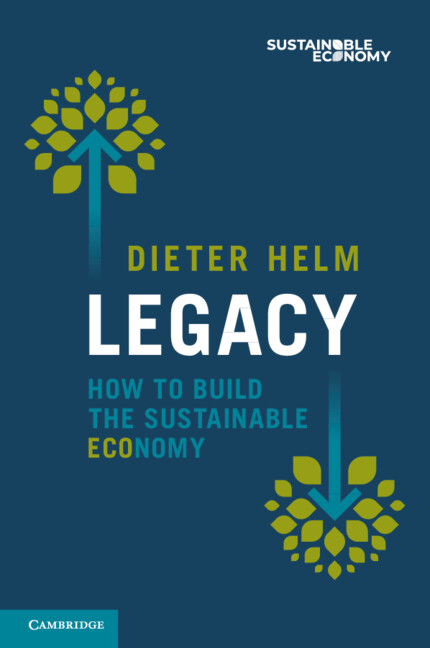
Almost everyone agrees we are on an unsustainable path. Disputes are about just how unsustainable that path is. What few people grasp is the obvious implication: what is unsustainable will not be sustained. We can either get ourselves onto the sustainable path now, or we can be forced back to it as the impacts on climate change, biodiversity loss and the decline in the key infrastructures are manifest.
What my new book Legacy addresses is the question: what would the sustainable economy look like? Defining this helps to shape both our understanding of what the gap is, and what would need to be done to get from here to this sustainable economy.
The answers to this questions are, perhaps not surprisingly, quite radical. They depend on the objective and that, in turn, depends upon an ethical judgement. I take this objective to be one that bequeaths to the next generation a set of assets at least as good as the set we inherited, and in particular those assets that are the core to enabling citizens to participate in the economy and society.
This might appear uncontentious, and yet it is far removed from the objective of maximising GDP, and the utilitarian ideal of ensuring the next generation is as happy as we are, basking in their utility. It is not about making people happy, whatever that means, but allowing them the core capabilities to choose how to live their lives.
Doing this means that we must live within our means, and in particular our environment means. We must maintain the core assets and make good the damage we have done. Capital maintenance means maintaining the climate and the biodiversity, the energy, water, transport and communications systems, and also the health and education infrastructures. These are all systems, and our duty to maintain them means not only that there cannot be any depreciation, but also that we should pay for this maintenance out of current income. This is not investment, and it should not be financed through borrowing. It is pay-as-you-go.
Capital maintenance means that we should pay for the damage we do and the polluters – us – should pay. Only after these current costs have been deducted from income can the balance be made available for consumption.
That is not the end of our obligations to the next generation. There will need to be some genuine enhancements, and for these we have to invest, and, in order to invest, there need to be savings. Savings is forgone consumption. Thus it is income minus capital maintenance and pollution charges minus savings that determines what is left to make our consumption sustainable.
Once these adjustments have been made, we can live within our sustainable means. It would be a big adjustment, and departs from the usual Keynesian GDP arguments, which focus so heavily on borrowing to prop up consumer spending and hence demand.
This is not a “no growth” argument. On the contrary, the economic prospects for improving our standards of living are very great. Technology causes growth, and technical change is advancing at a very rapid rate. Think how quantum computing, AI, synthetic biology and genetics, and robotics will change our world in the coming generation. Reading this, even if you agree with my analysis, it would not be surprising if you concluded that this is never going to happen. What we are doing to our planet is not sustainable. It is a question of how it ends, and what we do now to cushion the fallout. What my book sets out is what we would have to do to get a much better future – the capital maintenance, the polluter-pays principle, debt only for genuine investment, a modified universal basic income to continue the adjustments to sustainable consumption, a systems approach to infrastructure planning and regulation, and a constitutional protection of the interests of the next generation. It is radical, but also necessary if we want to live within our sustainable means.

Legacy by Dieter Helm
Latest Comments
Have your say!